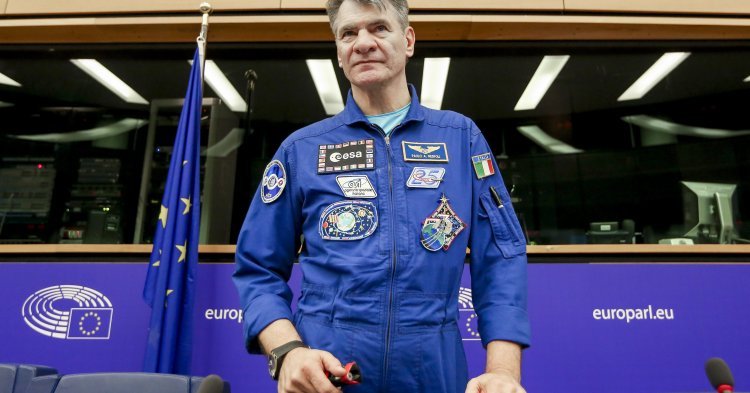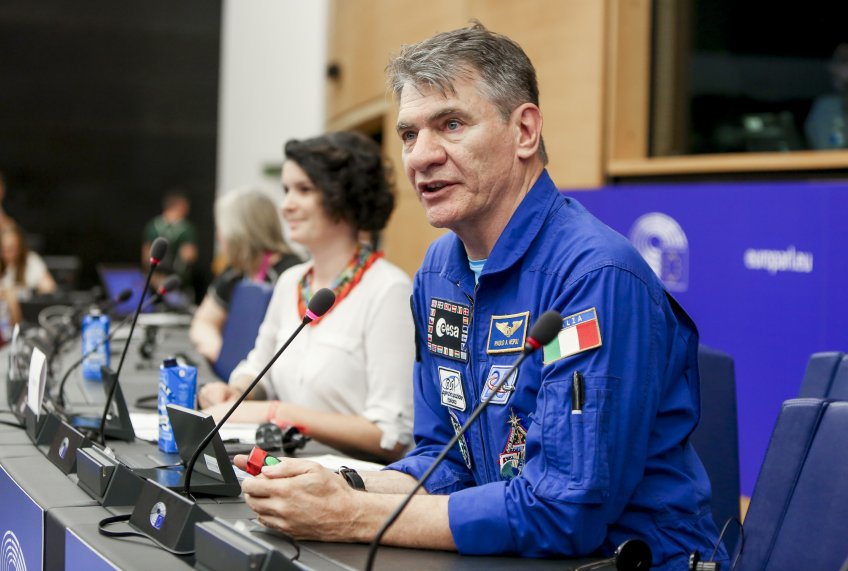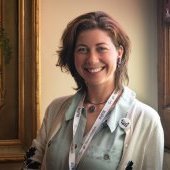Anna Ferrari: How can space research help us understand our planet?
Paolo Nespoli: In general, science, technology and research are important elements for us human beings because they allow us to better understand both ourselves and nature. If we do not understand where we are, then we do not understand what we do, what are the positive and negative aspects, nor how to live better in our environment. Space is a place where you can do things that you cannot do anywhere else, so it’s worth going there for an experience – not only because in the end we are humans and we want to go everywhere, but also because using those special conditions such as microgravity and distance from the Earth, we can increase our knowledge.
AF: What can we do to protect the planet, taking as inspiration these studies in space?
PN: Everything is valuable: the way you set your life, the way you relate to the environment and to other people. We must become aware that we are a small link in this chain, which is a chain that is eventually put around the world. When I looked at this planet from space, with all these cities and roads, it seemed like a chained world and we are the chain. We must realise that every one of us, young and old ones – but young people even more so – has an impact on this planet, and then decide how to act accordingly.
Also, you don’t see borders from space. You see a full entity, no nations. You see a planet in equilibrium in the space, protected only by the tiny line of the atmosphere. You see the devastation that we are producing to our Earth, too. But the Earth is not going to die, it will manage. It’s us who are going to disappear if we keep going like this.
AF: What role can or should the European Union have as a political force?
PN: From space one can see that nations, however great they are, are small. If we do not work together, we will not get anywhere. Maybe we will make our own garden cleaner, to the detriment of everything else. In my opinion, while territory control authorities are absolutely necessary, thanks to the current abilities of communication and movement it is beyond doubt that the controlled spaces have to expand and reach continental size. Only in that case, we can start having the ability to manage an area that is not small, in order to put together resources, common research, as well as social, economic, political and industrial goals, and avoid putting efforts in opposite directions. The European Union has an important role because Europe is one of these macro-geographical areas.
AF: When you were in the military in Lebanon, meeting the journalist Oriana Fallaci changed your life. How relevant in a career is the influence of certain people whom we meet on our path and who spur us to follow our dreams?
PN: Life seems like a series of coincidences, but sometimes it feels like they come to you because you are looking for them. Others are completely random. In the end, however, everything around you is important, so we should learn to pay more attention, rather than always being immersed in our smartphones, for example.
I happened to meet an important person like Oriana Fallaci and I did not do anything else than being myself. It is true that she asked me what I wanted to do in my adult career. Maybe that was the moment when I realised that I needed to think again about my life and redirect it. Would it have been the same if I had never met Oriana Fallaci? I do not know, but at that time it served me well. However, you do not need to be faced with major encounters to understand what you want to do in life. Just try to look around yourself in life, understand our reality and use everything to realise your dreams.
AF: How is it possible to pursue personal passions against adversity?
PN: It’s not easy at all. With hindsight it is always simple. If I knew my future in 25 years since back then, I would have been much calmer. For example, I managed to fly into space for the first time and when I came back, they told me there were no more opportunities. Then a few years later, I flew again into the space. I came back and they told me again that it had been the last chance. Then the third mission came along. My life has always been a complex story of different components. It is not a clear path, I have never really decided the way. It has always been a road where I was not able to look and know beyond eyesight if there was a ravine or a villa with a pool, so to say.
AF: Incredible, I thought that once you become an astronaut, you are forever an astronaut.
PN: No, it’s not like that. Now I am at the end of my third mission and career as an astronaut, I’m trying to figure out what to do “when I grow up”. I feel European, I feel Italian, but I have spent, willy-nilly, the last 25–30 years of my life outside Italy. Yet I keep feeling Italian, I want to return to Italy and do something there. It often makes me angry because when I go back to Italy, I see things that are wrong, but not much interest in changing. I wonder why it is so in Italy, when it could be much better.
Long story short, you never stop growing. The more you are aware of your personal abilities, the more you can try to do different and more difficult things. Paradoxically, erring is important because if you don’t make mistakes, it means that you are not trying something new. You must be able to fail. The important thing is to learn from these mistakes that are necessary to growth, to understand how not to repeat them and then move on. This is what I have tried to do in my life, and I also urge young people to try things and not feel useless or incapable if you do not make it or if you make a mistake. Figure out what the good things are for you and use them. At the same time, understand what the bad things are and throw them behind your back.
AF: Do you feel like an alien coming back to Earth after having been in the space?
PN: No, it’s actually nice to go back among human beings. Gravity feels like a chain on your body, but it’s beautiful to rediscover the senses, having human contacts, seeing friends, a series of things that do not exist in space.
AF: Does religious perception and the belief in God change, going into space?
PN: I would say no. The space, in my opinion, does not give such answers, if anything it raises more questions. But this is normal: the more we know, the more we realise that we do not know.
AF: What advice would you give, especially to young people?
PN: Advice? Everyone should do their own thing. But I would give one remark: make as many experiences as possible and try to get out of your bubble, discover other cultures, so as to open up the horizons and understand that there is not only one way to see something. Study other languages! Feeling weak because you are in another culture is extremely important to understand diversity, so I would suggest to make experiences abroad, go to unusual places, not only in the United States: go to Africa, go to India. Go to places where you are uncomfortable because there is so much to learn there.



Follow the comments: |
|
